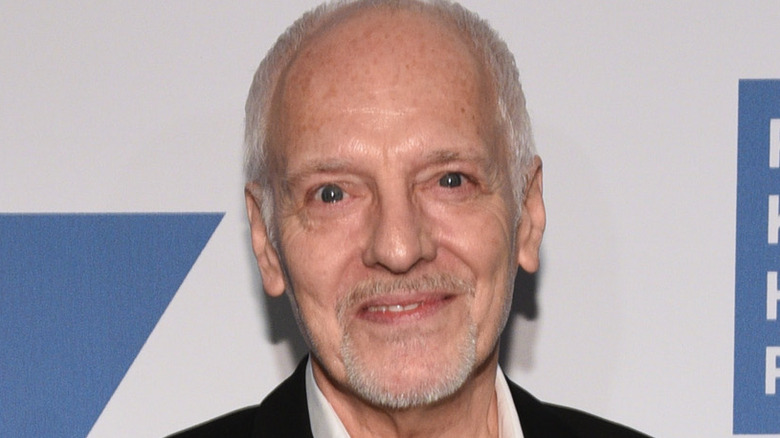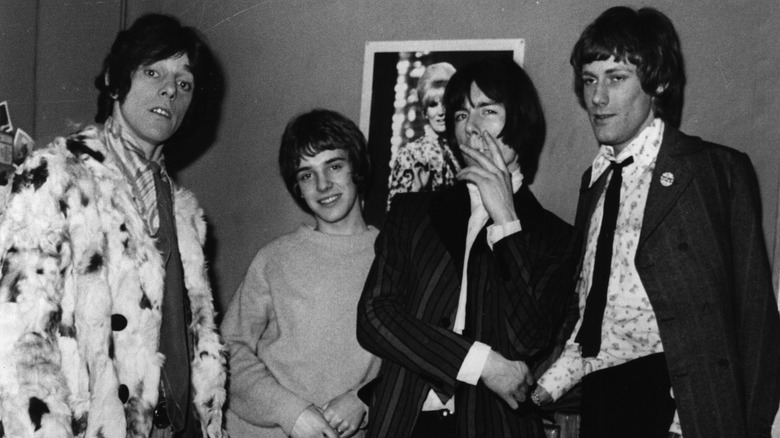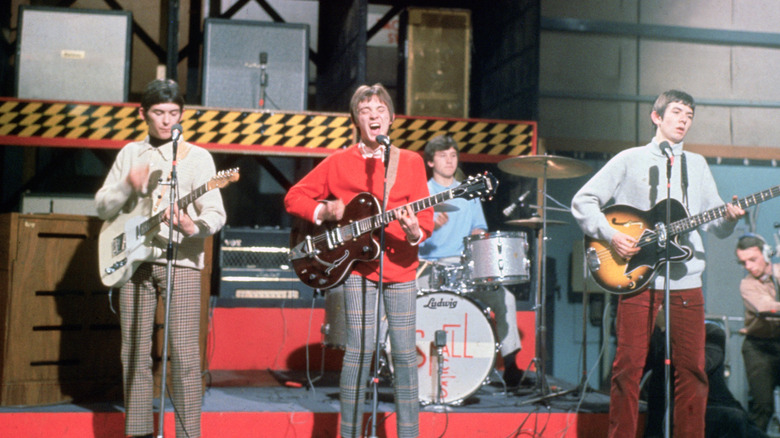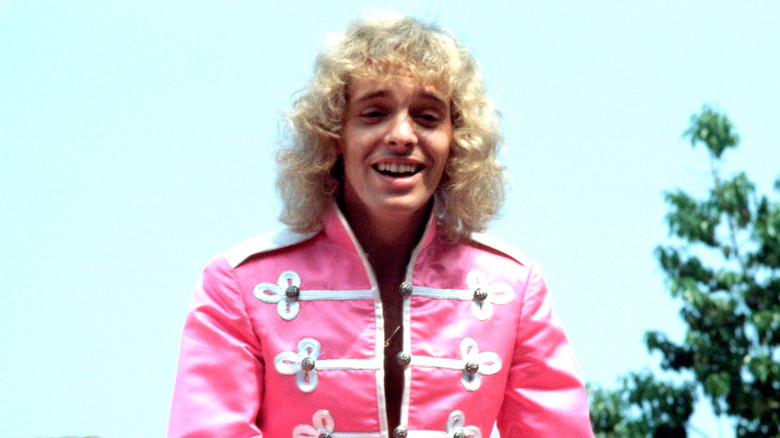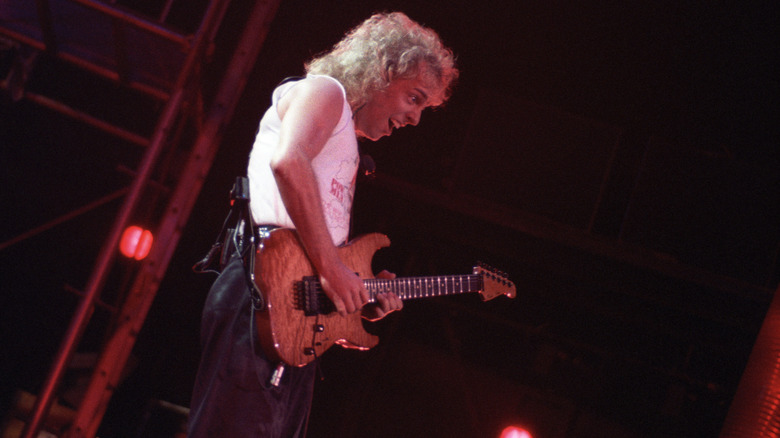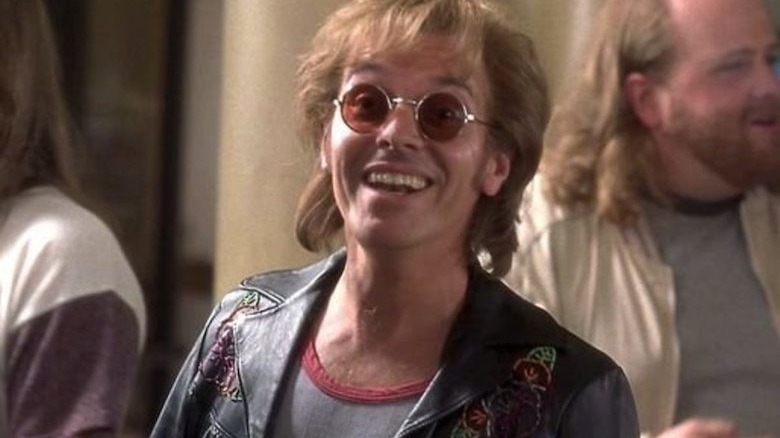The Untold Truth Of Peter Frampton
You can't talk about arena rock without bringing up Peter Frampton's best-selling album "Frampton Comes Alive!" With its mix of radio-friendly hard rockers and tender ballads, as well as Frampton's use of the talkbox effect on his guitar (as heard on hit singles "Do You Feel Like We Do?" and "Show Me the Way"), the double album sold over 10 million copies (via Biography) and remains a beloved classic rock staple. So much has been said about this release, and that could also apply to Frampton's supergroup Humble Pie. This band helped increase his profile outside his native England and give him some name recall when he started his much more successful run as a solo performer.
Unfortunately, after a career that has spanned well over five decades, it looks like Frampton is now in the home stretch, having been diagnosed with the autoimmune disease inclusion body myositis in 2019, according to Guitar.com. With the illness causing him to lose strength in his hands and limbs, it remains unclear whether he would be able to resume his farewell tour, which was cut short due to the pandemic. But he definitely has an enviable resume as a musician, and there are several interesting facts about his career that many fans might not know or might not be too familiar with.
Frampton's teen idol beginnings with The Herd
As a teenager, Peter Frampton got his first big break as the lead singer and guitarist of a band called The Herd. Compared to Frampton's later output as a musician, The Herd's songs were vastly different, as the group specialized in psychedelic pop-rock, as evidenced in their first single, 1967's "I Can Fly." As pointed out by Dandy in Aspic, the single flopped, but their next two were much more successful, allowing The Herd to tour with some of England's biggest bands of the era, including The Kinks and The Who.
The Herd broke out with an uncharacteristically poppy song, "I Don't Want Our Loving To Die," which peaked at No. 5 on the U.K. charts in 1968. But just like many other originally harder-edged or niche bands, the group found themselves pressured to record more mainstream material. Frampton and keyboardist Andy Bown were not happy with this change in direction, and it wasn't helping matters that the young frontman was getting marketed as a teen heartthrob; Rave magazine named him the "Face of 1968," and he was getting noticed far more often for his good looks than his guitar-playing skills.
By the end of 1968, Frampton, then only 18 years old, was clearly frustrated with his teen-idol status. At that time, he had become close friends with Small Faces frontman Steve Marriott, and it seemed like a possibility that he would soon be joining the R&B-influenced rockers as their new lead guitarist.
Frampton nearly joined the Small Faces ahead of their breakup
Similar to Peter Frampton, Steve Marriott bristled at the fact he was considered among the U.K.'s leading teen idols of the mid-to-late '60s. Like his Small Faces bandmates, he also wasn't a fan of the shiny, poppy singles the band's label preferred to release, such as "Sha-La-La-La-Lee." That's why it's little wonder that he saw a kindred spirit in Frampton, and that he started lobbying for his inclusion in the Small Faces even when he was still with The Herd. The other Small Faces, however, didn't think it was a good idea.
"I love Pete," said the band's keyboardist, Ian McLagan (via Mojo), "but it wasn't the right move for us. Maybe we should've got a trumpeter, not another guitarist!" Likewise, bassist Ronnie Lane, who was feuding with songwriting partner Marriott as their band continued to splinter, was not enthusiastic about the thought of The Herd's pretty-boy singer-guitarist joining the fold.
Per Ultimate Classic Rock, things came to a head when Marriott walked out in the middle of a Small Faces show in Paris on New Year's Eve 1968. They played a few more shows in Germany before breaking up in March 1969. While Lane, McLagan, and drummer Kenney Jones recruited singer Rod Stewart and guitarist Ronnie Wood — you may have heard of 'em — and became the Faces, Marriott and Frampton finally got their chance to team up as they formed Humble Pie with bassist Greg Ridley and drummer Jerry Shirley.
The awful movie that rendered Frampton irrelevant
All told, Peter Frampton's stint in Humble Pie was rather short-lived; per Biography, he recorded two albums with the blues-rockers before leaving in 1971 to start a solo career. By 1976, he was on top of his game as one of the world's biggest rock stars, thanks to his live double album, "Frampton Comes Alive!" The singles "Baby I Love Your Way," "Do You Feel Like We Do?," and "Show Me the Way" were all huge hits, and 1977's "I'm In You" was his highest-charting song to date, peaking at No. 2 on the Billboard Hot 100. It then all came crashing down one year later when he played Billy Shears in the disastrous movie adaptation of the Beatles' classic album "Sgt. Pepper's Lonely Hearts Club Band."
Despite starring Frampton, the Bee Gees, and dozens of other leading musicians (or because these non-actors were so prominently featured), "Sgt. Pepper's" was an absolute flop, with barely a semblance of a cohesive plot. The acting, as hinted, was also subpar, with Goldmine noting that Frampton "[spent] a good portion of the 83-minute debacle smiling, baring his chest, walking around in all his blonde, blow-dried glory, and acting highly confused." That's not the kind of review any rock star wants to see, and for Frampton, he was essentially reduced to flash-in-the-pan status before he even turned 30.
Frampton comes alive ... as a sideman
It wasn't just the abject failure of "Sgt. Pepper's Lonely Hearts Club Band" (the film, not the album) that contributed to Peter Frampton's decline. He temporarily put his music career on hold after a serious car accident (via Biography), and when he returned to the studio, his albums were no longer putting up big sales numbers. It took a collaboration with childhood friend David Bowie to get Frampton back on track, though naturally, he was no longer the main man — instead, he was playing lead guitar on Bowie's 1987 record "Never Let Me Down" and the tour that followed the album's release.
While this was Frampton's highest-profile gig since, well, "Sgt. Pepper's," it wasn't like "Never Let Me Down" was a critical darling. Far from it, in fact — Spectrum Culture covered the album's many perceived faults, including songs that were too long for the pop-radio format, a confusing mishmash of genres, and unfortunately, Frampton's guitar playing. His performance on the song "Zeroes" was singled out for criticism, as the outlet opined that his solos "[seemed] random and out of place" while his riffs in other parts seemed to borrow too much from the Beatles.
It wouldn't be another seven years before Frampton enjoyed solo success once again, but for what it's worth, "Never Let Me Down" was a modest hit, peaking at No. 34 on the Billboard 200 and spawning two Top 30 hits on the Hot 100.
His important behind-the-scenes roles during the making of Almost Famous
With his appearances on "The Simpsons" and "Family Guy," Peter Frampton had a great time parodying himself on the two iconic animated series. But his most important contribution to Generation X pop culture (despite the film being a period piece) was arguably the behind-the-scenes work he did on the set of Cameron Crowe's 2000 movie "Almost Famous." As cited by Variety, he noted in his autobiography, "Do You Feel Like I Do?: A Memoir," that he was present for the entirety of pre-production as he wrote some songs for the fictional band Stillwater and helped Billy Crudup, who played Stillwater guitarist Russell Hammond, look like a plausible 1970s "guitar god."
"Whatever part Billy plays, he's always totally convincing," Frampton wrote. "He only had a couple of weeks of guitar lessons before we met. It amazed me how quickly he picked it all up. The playing and the stance were all important. So I was an on-set library of band information to help Billy and Jason Lee create their characters." The veteran rocker also served as an "authenticity advisor" who made sure all the musical equipment used in "Almost Famous" was appropriate for the era.
Although Crudup was a fast learner, his guitar parts as Russell were actually played by Frampton and Pearl Jam axeman Mike McCready. And in a nice little Easter egg for classic rock fans, Frampton also had a brief cameo in "Almost Famous," playing a Humble Pie roadie named Reg.
